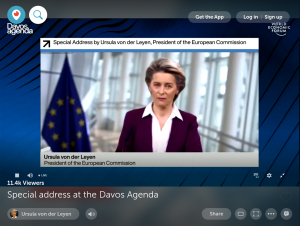On Tuesday, 26 January 2021, Dr. Ursula von der Leyen, President of the European Commission delivered a special address at “Davos Agenda Week” devoting much of her speech to the European Union’s response to the COVID-19 pandemic.

While President von der Leyen did address Europe’s commitment to the global coronavirus response, absent from her speech were any policy recommendations relating to the exigent need to the sharing of rights in inventions, data, biologic resources and know-how to scale production, increase competition and speed the delivery of vaccines, therapeutics and other technologies to countries outside the European Union.
President von der Leyen stressed that the European Union “invested billions to help develop the world‘s first COVID-19 vaccines” to create a “truly global common good”. Perhaps in relation to the current imbroglio involving the shortfall of AstraZeneca vaccines intended for the European Union, she delivered the following ultimatum, noting that the EU would create a “vaccine export transparency mechanism” to monitor the export of COVID-19 vaccines from Europe.
The EU and others helped with money to build research capacities and production facilities. Europe invested billions to help develop the world‘s first COVID-19 vaccines. To create a truly global common good. And now, the companies must deliver. They must honour their obligations. This is why we will set up a vaccine export transparency mechanism. Europe is determined to contribute. But it also means business.
President von der Leyen provided details for the following public-private partnership – European Health Emergency Response Authority (HERA) which is designed to respond to future pandemics as well as existing pathogens, including “developing and manufacturing vaccines at scale to respond”.
The programme will rest on three main pillars: First, it will be proactive. We cannot wait for the next pandemic to start preparing. So this new programme will be permanent. And it will be fully dedicated to discovering and preparing for known and emerging pathogens, and then developing and manufacturing vaccines at scale to respond to them. Second, it would secure long-term and predictable funding for this task, rather than reallocating resources every time. And third, it would bring together cutting-edge tech-companies, blue-chip manufacturers, as well as regulators such as our European Medicines Agency or the European Commission.
The full text of von der Leyen’s address can be found here: https://ec.europa.eu/commission/presscorner/detail/en/speech_21_221
The portion of her speech on the COVID-19 response is reproduced below.
This spirit of cooperation is the only mind-set which can help us tackle our challenges. The pandemic has shown the limitations of some of our old ways of working. But it has also created new ones, in record time. Take the vaccine that will hopefully protect us all from COVID-19. What normally takes five to ten years, was achieved in ten months. Because the world pooled its resources, scientists shared their expertise and different manufacturers worked together.
The EU and others helped with money to build research capacities and production facilities. Europe invested billions to help develop the world‘s first COVID-19 vaccines. To create a truly global common good. And now, the companies must deliver. They must honour their obligations. This is why we will set up a vaccine export transparency mechanism. Europe is determined to contribute. But it also means business.
And when it came to procurement, we decided to work together too. Because in our world of global supply chains, the health of our citizens and global economic recovery go hand in hand.
This is also why early in the pandemic, the EU, together with organisations like the World Economic Forum, the Gates Foundation and Global Citizen organised pledging initiatives to mobilise funding for the global coronavirus response. In the COVAX vaccination alliance, the EU, together with 186 countries, will be securing millions of doses of vaccines for low-income countries. The point is that it is only by working together – across borders and across sectors – that we can tackle our global challenges. No private company or public authority can do it alone.
This is why I believe this new form of blended partnerships should prepare and protect us against the next big risk. This is a blueprint for cooperation in today’s world. We need to bring together the innovation and capability of the private sector, and the long-term vision and predictable funding of the public sector. It is in this spirit that Europe will propose to create a bio-defence preparedness programme. This will be a public-private partnership – and it will sit within our new European Health Emergency Response Authority, or HERA for short.
The programme will rest on three main pillars: First, it will be proactive. We cannot wait for the next pandemic to start preparing. So this new programme will be permanent. And it will be fully dedicated to discovering and preparing for known and emerging pathogens, and then developing and manufacturing vaccines at scale to respond to them. Second, it would secure long-term and predictable funding for this task, rather than reallocating resources every time. And third, it would bring together cutting-edge tech-companies, blue-chip manufacturers, as well as regulators such as our European Medicines Agency or the European Commission.
We know that preparedness is everything. And we know that in a pandemic there is no time to lose. We need this new public-private approach to detect earlier, develop together and manufacture faster at scale. This is not just true for pandemics or health. It is true for all major societal challenges.